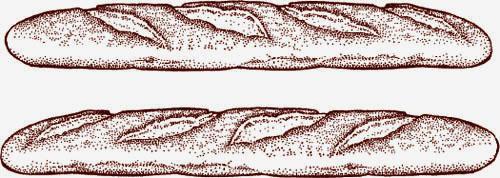Bread Machine (135 page)

 Rinse out a plastic dry measure with cold water. With the measuring cup still wet, measure out
Rinse out a plastic dry measure with cold water. With the measuring cup still wet, measure out
1
/
2
cup (for the 1
1
/
2
-pound loaf) or
3
/
4
cup (for the 2-pound loaf) of starter and set it aside for the dough (it will slide right out of the measuring cup). If you have not already stored the
pâte fermentée
earlier, you can store the rest of the starter (enough for 2 to 3 batches of Pain de Paris) in the refrigerator for up to 48 hours (see
Bread Machine Baker’s Hint: Storing
Pâte Fermentée
for more information). Or discard it and make a new batch the next time you make this bread.
 To make the dough, place the water, flour, gluten and yeast in the pan according to the order in the manufacturer’s instructions. (You don’t have to wash out the bread pan from the starter.) Set crust on dark and program for the French Bread cycle; press Start. After Knead 1, press Pause. Add the reserved
To make the dough, place the water, flour, gluten and yeast in the pan according to the order in the manufacturer’s instructions. (You don’t have to wash out the bread pan from the starter.) Set crust on dark and program for the French Bread cycle; press Start. After Knead 1, press Pause. Add the reserved
pâte fermentée
and the salt. Press Start to continue. The dough will be moist and smooth.
 When the baking cycle ends, immediately remove the bread from the pan and place it on a rack. Let cool to room temperature before slicing.
When the baking cycle ends, immediately remove the bread from the pan and place it on a rack. Let cool to room temperature before slicing.
Technique: Shaping Long Loaves of Pain de Paris for Oven Baking
Makes 2 baguettes
1 recipe
Pain de Paris
dough
1 egg white beaten with 1 tablespoon of water, for glaze
 Line a baking sheet with parchment paper or grease two thin 2-inch-wide baguette pans. Turn out the dough onto a lightly floured work surface. Divide the dough into 2 equal portions.
Line a baking sheet with parchment paper or grease two thin 2-inch-wide baguette pans. Turn out the dough onto a lightly floured work surface. Divide the dough into 2 equal portions.
 Flatten each portion into a thin 10-by-inch rectangle with the palm of your 6-inch rectangle with the palm of your hand. Starting on a long side, roll up, using your thumbs to help roll tightly. With the side of your hand, define a depression lengthwise down the center of the dough. Fold over and pinch seams to seal. Gently transfer, seam side down, to the prepared pan. No dough will hang over the ends of the pan. Repeat with the second piece of dough. Cover loosely with plastic wrap and let rise at room temperature until fully doubled in bulk, about 30 minutes.
Flatten each portion into a thin 10-by-inch rectangle with the palm of your 6-inch rectangle with the palm of your hand. Starting on a long side, roll up, using your thumbs to help roll tightly. With the side of your hand, define a depression lengthwise down the center of the dough. Fold over and pinch seams to seal. Gently transfer, seam side down, to the prepared pan. No dough will hang over the ends of the pan. Repeat with the second piece of dough. Cover loosely with plastic wrap and let rise at room temperature until fully doubled in bulk, about 30 minutes.
 Twenty minutes before baking, place a baking stone or tiles on the center rack of the oven and preheat to 425°F.
Twenty minutes before baking, place a baking stone or tiles on the center rack of the oven and preheat to 425°F.
 Beat the egg white and water with a fork until foamy. Brush the surface of the loaves with the glaze. With a small, sharp knife, slash the surface 3 or 4 times on the diagonal, no more than 14 inch deep. Place the pans directly on the stone and bake for 20 to 25 minutes, or until the loaves are golden brown and sound hollow when tapped with your finger. Remove the loaves from the pans immediately to cool on a rack.
Beat the egg white and water with a fork until foamy. Brush the surface of the loaves with the glaze. With a small, sharp knife, slash the surface 3 or 4 times on the diagonal, no more than 14 inch deep. Place the pans directly on the stone and bake for 20 to 25 minutes, or until the loaves are golden brown and sound hollow when tapped with your finger. Remove the loaves from the pans immediately to cool on a rack.

 Leftover Bread Cookery: Stuffed-Under-the-Skin Roast Chicken
Leftover Bread Cookery: Stuffed-Under-the-Skin Roast Chicken
Serves 4
My mom makes a fabulous roast chicken, and when it is stuffed it is even better. While this recipe has the stuffing strategically placed under the skin, if you triple the stuffing recipe, you can stuff the cavity instead. Fresh breadcrumbs are a must. Serve this chicken with garlic mashed potatoes.
For the herb stuffing:
1 large shallot, minced
1 clove garlic, pressed
3 tablespoons butter or margarine
1
/
4
cup chopped fresh flat-leaf parsley
1 tablespoon minced fresh herbs, such as tarragon, thyme, or sage
2
/
3
cup fresh coarse breadcrumbs from white, whole wheat, or flavored bread
For the chicken:
One 5
1
/
2
-pound roasting chicken
Juice of 1 lemon
Salt and fresh-ground black pepper
 Preheat the oven to 400°F.
Preheat the oven to 400°F.